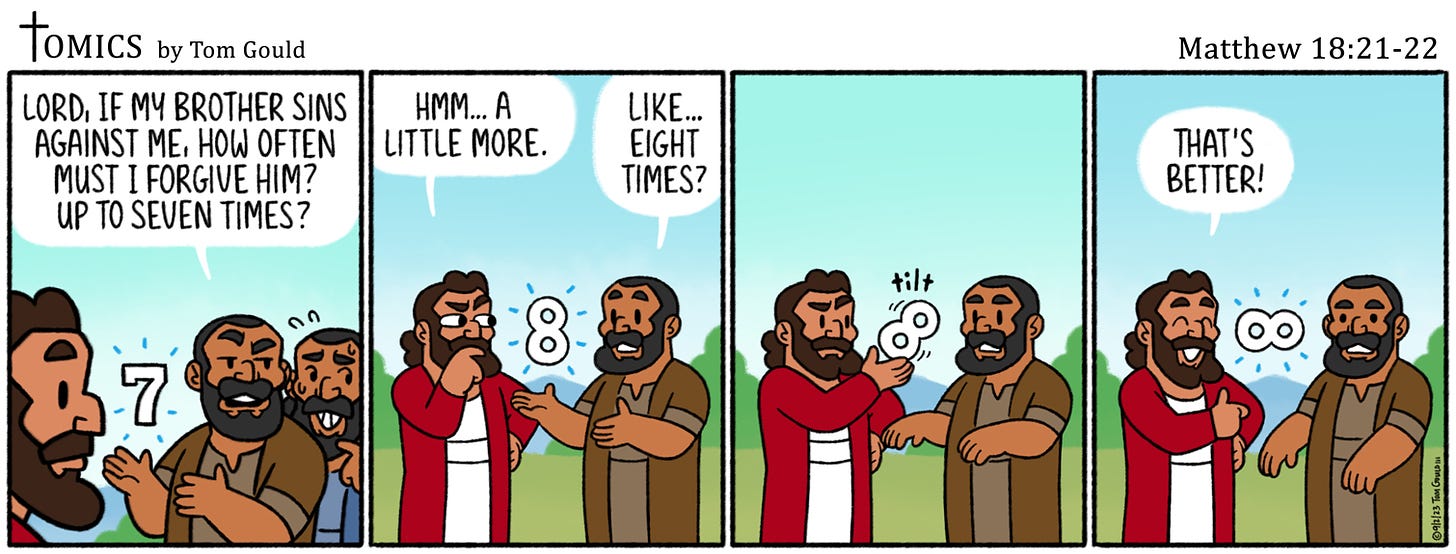Good morning! Bet you were wondering when you’d get another one of these.
Reading 1
Sir 27:30—28:7
Wrath and anger are hateful things, yet the sinner hugs them tight. The vengeful will suffer the LORD's vengeance, for he remembers their sins in detail. Forgive your neighbor's injustice; then when you pray, your own sins will be forgiven. Could anyone nourish anger against another and expect healing from the LORD? Could anyone refuse mercy to another like himself, can he seek pardon for his own sins? If one who is but flesh cherishes wrath, who will forgive his sins? Remember your last days, set enmity aside; remember death and decay, and cease from sin! Think of the commandments, hate not your neighbor; remember the Most High's covenant, and overlook faults.
Sirach is one of those deuterocanonical books, which are left out of some protestant bibles because they’re left out of certain Jewish canons. But it was included in the Septuagint, which was a Greek translation of the Hebrew scriptures. It was very popular at the time of Jesus and the Apostles because, strangely enough, more people could read Greek than Hebrew, even in Israel.
All of which is to say, any similarities between this reading and today’s Gospel are not coincidental. Jesus was almost certainly aware of Sirach. He wasn’t make stuff up out of whole cloth.
Because God didn’t just plop down His revelation in one big blob, letting us figure it out from there. He slowly revealed Himself through the patriarchs and the prophets over millennia. Jesus was the culmination of that revelation.
Responsorial Psalm
Ps 103:1-2, 3-4, 9-10, 11-12
R. The Lord is kind and merciful, slow to anger, and rich in compassion.
Bless the LORD, O my soul;
and all my being, bless his holy name.
Bless the LORD, O my soul,
and forget not all his benefits.
R. The Lord is kind and merciful, slow to anger, and rich in compassion.
He pardons all your iniquities,
heals all your ills.
He redeems your life from destruction,
crowns you with kindness and compassion.
R. The Lord is kind and merciful, slow to anger, and rich in compassion.
He will not always chide,
nor does he keep his wrath forever.
Not according to our sins does he deal with us,
nor does he requite us according to our crimes.
R. The Lord is kind and merciful, slow to anger, and rich in compassion.
For as the heavens are high above the earth,
so surpassing is his kindness toward those who fear him.
As far as the east is from the west,
so far has he put our transgressions from us.
R. The Lord is kind and merciful, slow to anger, and rich in compassion.
When God forgives, He really forgives. His forgiveness is really beyond anything we can even imagine. We try to forgive others, move on, not dwell on it; but to God, forgiveness means it didn’t happen. It’s done. That’s what allows us to move forward in our relationship.
Reading 2
Rom 14:7-9
Brothers and sisters: None of us lives for oneself, and no one dies for oneself. For if we live, we live for the Lord, and if we die, we die for the Lord; so then, whether we live or die, we are the Lord's. For this is why Christ died and came to life, that he might be Lord of both the dead and the living.
This passage comes in the context of theological disputes. At the time Paul wrote his Letter to the Romans, we didn’t exactly have a fixed calendar of holy days on which to fast, and so arguments came up over whether Christians could eat meat on certain days, which feasts were to be celebrated, etc, etc.
Paul’s advice? “Let everyone be fully persuaded in his own mind. Whoever observes the day, observes it for the Lord. Also whoever eats, eats for the Lord, since he gives thanks to God; while whoever abstains, abstains for the Lord and gives thanks to God.”
In other words, as long as you’re trying to honor God and not violating the moral law, you’re probably fine. Why is that?
That’s this passage. We celebrate feasts and offer penance because of Christ, not each other. If we feel called to abstain from meat as a small mortification, then we should do so. But we shouldn’t look down on people who aren’t so called. They’re living and dying for Christ in their own way.
Alleluia
Jn 13:34
R. Alleluia, alleluia.
I give you a new commandment, says the Lord;
love one another as I have loved you.
R. Alleluia, alleluia.
Jesus is expanding on the Law that’s already been provided: “You shall love your neighbor as yourself.”1
In Leviticus, this is referring primarily to other Jews. Jesus is expanding it to everyone.
Gospel
Mt 18:21-35
Peter approached Jesus and asked him, "Lord, if my brother sins against me, how often must I forgive? As many as seven times?"
Jesus answered, "I say to you, not seven times but seventy-seven times.
That is why the kingdom of heaven may be likened to a king who decided to settle accounts with his servants. When he began the accounting, a debtor was brought before him who owed him a huge amount. Since he had no way of paying it back, his master ordered him to be sold, along with his wife, his children, and all his property, in payment of the debt. At that, the servant fell down, did him homage, and said, 'Be patient with me, and I will pay you back in full.' Moved with compassion the master of that servant let him go and forgave him the loan.
When that servant had left, he found one of his fellow servants who owed him a much smaller amount. He seized him and started to choke him, demanding, 'Pay back what you owe.' Falling to his knees, his fellow servant begged him, 'Be patient with me, and I will pay you back.' But he refused. Instead, he had the fellow servant put in prison until he paid back the debt. Now when his fellow servants saw what had happened, they were deeply disturbed, and went to their master and reported the whole affair.
His master summoned him and said to him, 'You wicked servant! I forgave you your entire debt because you begged me to. Should you not have had pity on your fellow servant, as I had pity on you?' Then in anger his master handed him over to the torturers until he should pay back the whole debt. So will my heavenly Father do to you, unless each of you forgives your brother from your heart."
“Seventy-seven times” was symbolic for “large, basically uncountable number.”
The debt the Unforgiving Servant owes is, likewise, incalculable. He’ll never be able to pay it back. Such is the case with us and God. God is perfect, so any sin is too much. But God is willing to forgive, if we just ask.
The other condition is that we do the same for others. “Forgive us our trespasses, as we forgive those who trespass against us,” as Jesus taught us in the Lord’s prayer.
Why though? Shouldn’t we seek justice? No! Seeking justice is all-encompassing; it includes us as well as those who owe us. If God forgives us for every sin we’ve ever committed, while we forgive the minor, every day sins committed against us, mathematically, we still come out ahead.
So, we should be grateful for God’s forgiveness, and mimic His behavior instead.





